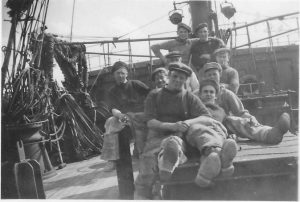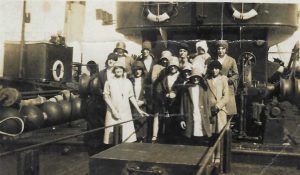
THE MOST DANGEROUS JOB IN THE WORLD
Imagine if you will, being aboard a small trawler off the Russian coast, low in the water, the wind lashing, huge waves crashing against the sides, showering you in cold water before washing over a slippery deck. You’re dressed in cumbersome oilskins, a knife in your hand, fighting to stay upright and gut fish, hundreds of fish that almost reach to your waist, for ten, twelve, or more hours at a time. And in the winter working in temperatures so low you have to go out with an axe to chop away ice that forms on the rigging before the trawler becomes top-heavy and capsizes.
Imagine sitting at your meagre fireside, the wind howling down the chimney; when it’s blowing a gale ashore, knowing it will be a hundred times worse at sea, trying not to be afraid, not to think of your husband, your brother, father, or son as they battle the elements to bring home the fish.
WORSE THINGS HAPPEN AT SEA
Whenever I was worried about something, my nan would say, ‘Worse things happen at sea.’ It was simply a phrase she used until she told me of her brother Alf, skipper of the Steam Trawler Leicestershire, which was lost with all hands off the Old Man of Hoy in the Orkneys in the January of 1938. Fifteen men died, 12 of them married, leaving behind 23 fatherless children. It was not the only ship that sank that year. They were not the only men lost.

I admire the men, but I admire the women too. Women who remain ashore, keeping the family together, putting food on the table, budgeting, braiding nets for coppers, hoping the catch would be a good one, the market price fair. That he came home.
It’s not for nothing that fishing was, and still is, known as the most dangerous job in the world.
IT WAS A HARD LIFE
Many’s the time a man returned after three, perhaps four arduous weeks at sea to a pittance. Two days at home, three if you were lucky, then back to the ship, clean clothes in your kitbag, leaving your family behind.
It was a hard life, harder than I ever imagined. My research led me to books published in the 1930s and the hardship the men faced left me incredulous, but most of all made me feel proud of my heritage. It’s the inspiration behind The Dockyard Girls (previously The Women of Fishers Wharf).
Strong men, the last adventurers – and the strong women they loved and left behind.
